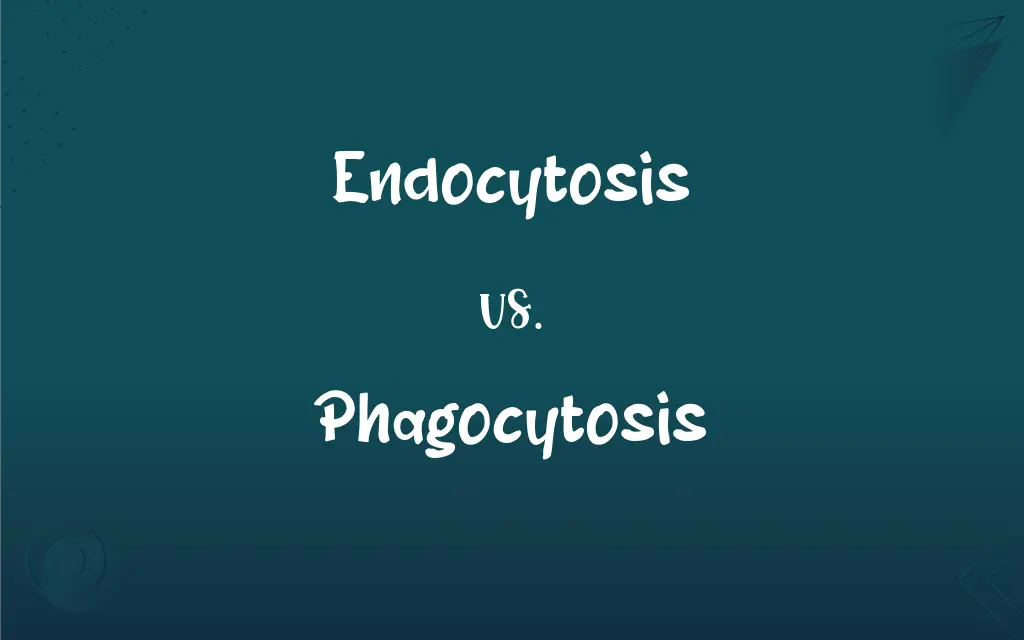Endocytosis vs. Phagocytosis: What's the Difference?
Edited by Aimie Carlson || By Janet White || Published on January 24, 2024
Endocytosis is a cellular process of engulfing material from outside the cell. Phagocytosis is a form of endocytosis where cells ingest large particles or cells.

Key Differences
Endocytosis is a cellular process where the cell membrane folds inward to engulf extracellular material. Phagocytosis, a specific type of endocytosis, involves the ingestion of large particles, such as bacteria or dead cells.
Endocytosis can be of various types, including pinocytosis (cell drinking) and receptor-mediated endocytosis. Phagocytosis is characterized by the engulfment of large solid particles and is often associated with immune responses.
Endocytosis is a broader term encompassing different methods of cellular intake. Phagocytosis specifically refers to the cellular process where large particles are engulfed and often digested.
The mechanism of endocytosis can involve the internalization of molecules via vesicles. In phagocytosis, the cell membrane extends to encircle and engulf large particles or pathogens.
Endocytosis is essential for nutrient uptake, regulation of cell surface receptors, and signal transduction. Phagocytosis is crucial in immune defense, as it helps eliminate pathogens and debris.
ADVERTISEMENT
Comparison Chart
Definition
Cellular process of engulfing extracellular material
Ingestion of large particles by cells
Types
Includes pinocytosis, receptor-mediated endocytosis
A specific form of endocytosis
Particle Size
Can involve small molecules, ions, or particles
Typically involves larger particles or cells
Role in Immune System
General process for nutrient uptake and signaling
Directly involved in immune response
Cellular Mechanism
Involves vesicle formation
Involves membrane extension and engulfment
ADVERTISEMENT
Endocytosis and Phagocytosis Definitions
Endocytosis
Uptake of external material into a cell.
Through endocytosis, cells can absorb small molecules and fluids.
Phagocytosis
A form of endocytosis targeting large substances.
In phagocytosis, macrophages engulf and destroy pathogens.
Endocytosis
Cellular internalization of substances via membrane folding.
Endocytosis is critical for neurotransmitter regulation in neurons.
Phagocytosis
Cellular ingestion of large particles or cells.
Phagocytosis is used by white blood cells to remove bacteria.
Endocytosis
Cell membrane engulfs substances to form an internal vesicle.
Endocytosis is a way cells adapt to changing environmental conditions.
Phagocytosis
Engulfment of large particles by cell membrane extensions.
Phagocytosis by immune cells is a key defense mechanism against infections.
Endocytosis
Process of cells absorbing external substances.
Endocytosis enables cells to intake nutrients from their environment.
Phagocytosis
Immune cells ingesting large foreign particles.
Phagocytosis plays a vital role in the body's response to infection.
Endocytosis
Cellular mechanism for importing extracellular materials.
Endocytosis helps cells to internalize signaling molecules.
Phagocytosis
Process where cells eat large particles or debris.
Phagocytosis is crucial in cleaning up cellular debris after tissue damage.
Endocytosis
A process of cellular ingestion by which the plasma membrane folds inward to bring substances into the cell.
Phagocytosis
The engulfing and destruction of particulate matter, such as a bacterium, by a cell.
Endocytosis
(cytology) The process by which the plasma membrane of a cell folds inwards to ingest material.
Phagocytosis
A form of endocytosis in which a cell incorporates a particle by extending pseudopodia and drawing the particle into a vacuole of its cytoplasm.
Phagocytosis
Process in which phagocytes engulf and digest microorganisms and cellular debris; an important defense against infection
FAQs
What role does endocytosis play in cells?
It's involved in nutrient uptake, signaling, and receptor regulation.
How does phagocytosis work?
Cells extend their membrane to encircle and ingest large particles or cells.
Are endocytosis and phagocytosis the same?
No, phagocytosis is a specific type of endocytosis.
What is typically engulfed in phagocytosis?
Large particles, such as bacteria or dead cells.
Is endocytosis a form of active transport?
Yes, it's an active process requiring energy.
Do all immune cells perform phagocytosis?
No, primarily phagocytes like macrophages and neutrophils.
What is endocytosis?
A cellular process of engulfing and internalizing materials from outside the cell.
Why is phagocytosis important in the immune system?
It helps immune cells to eliminate pathogens and debris.
Can phagocytosis occur in non-immune cells?
Rarely, as it's primarily an immune cell function.
Can all cells perform endocytosis?
Most cells have some capacity for endocytosis.
Can phagocytosis remove viruses?
Yes, phagocytes can engulf and destroy some viruses.
How is endocytosis regulated in cells?
It's regulated by cellular signals and receptor availability.
Does endocytosis contribute to cell communication?
Yes, by internalizing signaling molecules and receptors.
How does endocytosis differ in plant and animal cells?
The basic mechanism is similar, but the materials engulfed can differ.
What energy source is used in endocytosis?
ATP is used to fuel the endocytic process.
Can phagocytosis lead to inflammation?
Yes, it can trigger inflammatory responses.
What triggers phagocytosis in immune cells?
Recognition of foreign particles or damaged cells.
Are vesicles always formed in endocytosis?
Yes, vesicle formation is a key step in endocytosis.
Is phagocytosis specific to certain pathogens?
Phagocytes can ingest a wide range of pathogens.
What are examples of endocytosis?
Pinocytosis and receptor-mediated endocytosis.
About Author
Written by
Janet WhiteJanet White has been an esteemed writer and blogger for Difference Wiki. Holding a Master's degree in Science and Medical Journalism from the prestigious Boston University, she has consistently demonstrated her expertise and passion for her field. When she's not immersed in her work, Janet relishes her time exercising, delving into a good book, and cherishing moments with friends and family.
Edited by
Aimie CarlsonAimie Carlson, holding a master's degree in English literature, is a fervent English language enthusiast. She lends her writing talents to Difference Wiki, a prominent website that specializes in comparisons, offering readers insightful analyses that both captivate and inform.
































































